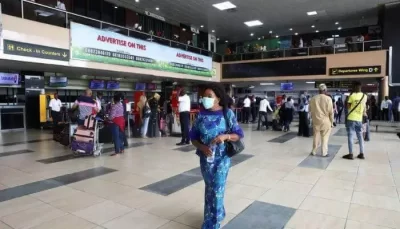Passengers groan as aviation fuel scarcity worsens flight delays
Air passengers on domestic routes in Nigeria are facing the double whammy of rising fares and worsening flight delays triggered by the scarcity of aviation fuel also known as JetA1.
Flight delays and cancellations have in recent weeks become the order of the day across Nigerian airports, with passengers getting more agitated over missed appointments in their intended destinations.
Tunde Atufe, a passenger told BusinessDay on Tuesday that flight delays now are unimaginable, hinting that as a regular traveller in the last two months, he has never travelled without having at least two hours flight delays.
Atufe said the sad thing about this is that the airlines hardly explain to passengers the reason for flight delays.
“Today (yesterday) I have an 8’oclock flight to Abuja and I am praying the flights do not get delayed. Since I noticed the incessant flight delays, I have had to adjust my own programmes. If I must travel, I have to travel a day or two days before my business meeting or engagement because I no longer trust Nigerian carriers to take off on scheduled time,” he said.
“I am at the airport. Aviation fuel is scarce, driving up ticket prices and causing delays; affecting both scheduled and private jet flights,” another passenger had told BusinessDay on Wednesday.
“My flight to Abuja was delayed today, Wednesday by Azman Air for over three hours and the airline did not communicate the reason for the delay. After three hours, we were shocked to hear that the flight has been cancelled and we should come and get refunds. I have been at the airport since morning, yet we haven’t gotten our refunds. It is a terrible situation,” Nosa, another passenger told BusinessDay.
Airline Operators of Nigeria, (AON) disclosed that airlines have lost N20 billion to refunds as a result of flight delays in year 2021, adding that no airline loves to delay flights but factors beyond the airlines’ control cause flight delays.
Some of the causes of flight delays he mentioned include bird strikes, airport apron congestion, lack of space for check-in, poor airport infrastructure, air traffic flow control, bad weather and unruly behaviour of passengers.
Airline Operators of Nigeria, (AON) last week said that JetA1 costs above N410 in Lagos, N422 in Abuja and Port Harcourt, and N429 in Kano per litre and has continued to rise fast and steadily.
They hinted that on top of the continuous rise in the fuel price, supply is at best epileptic at several airports thereby causing delays, adding that supply nationally is at best unpredictable and several times a day, airlines are standing, waiting for fuel to be supplied at airports across the country.
Kingsley Ezenwa, media and communications manager, Dana Air confirmed that aviation fuel scarcity is creeping in gradually.
“I am at the airport. Aviation fuel is scarce, driving up ticket prices and causing delays; affecting both scheduled and private jet flights,” a passenger had told BusinessDay on Wednesday.
Obiora Okonkwo, chairman of United Nigeria Airline, said aviation fuel constitutes 40 percent of airline’s operating costs, and has continued to eat deep into revenues of airlines that barely struggle to stay afloat.
Okonkwo predicted that Jet A1 cost might even rise to N500 per litre before March 2022 and this will definitely force airlines to adjust the ticket price to meet up with cost demands.
Already airlines have increased economy flight tickets for domestic routes from about N30,000 to a base fare of N50,000 and above.
According to AON, while flight delays and cancellations occur all over the world, it is instructive to note that in Nigeria, 80 percent of the causes of delays and cancellations are due to factors that are neither in the control of airlines nor caused by them.
They had listed other reasons for the incessant flight delays in Nigeria to include weather, inadequate aircraft parking space due to congested Aprons, restrictions caused by sunset airports, delays due to VIP movement, frequent bird strikes and Foreign Object Damage (FOD), unavailability of forex for spare parts and maintenance and delays from Customs in the clearing of critical safety spare parts among others. (BusinessDay)


